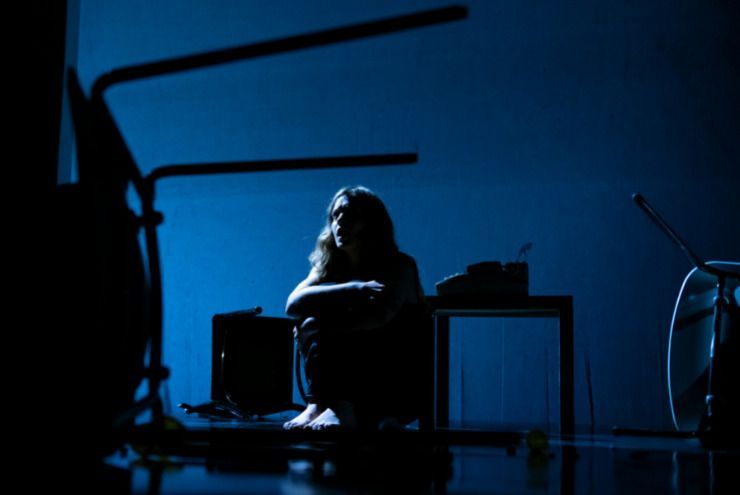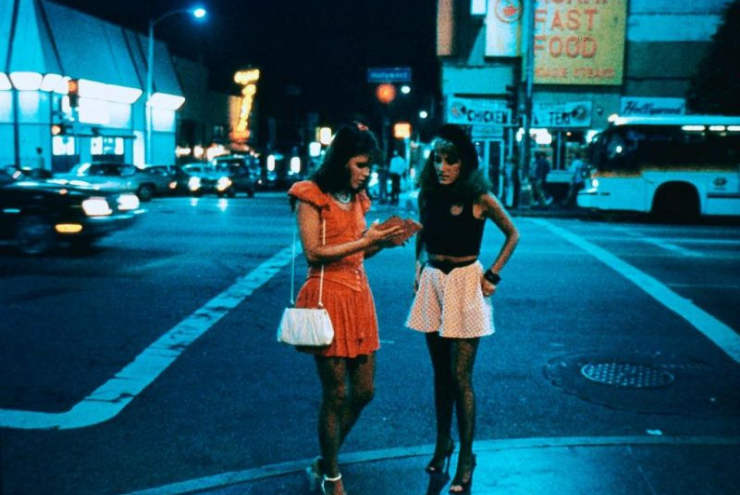By Addie Tsai
I first learned of the playwright Sarah Kane through Houston’s Catastrophic Theatre and founder Jason Nodler in 2011, just a few months after I embarked on a dance theater collaboration with a contemporary ballet and dance theater company I had followed avidly for many years. I was running off the high of what the best collaborative relationships can be. It was through that collaboration that I would meet and date one of the actors cast in the Catastrophic Theatre’s production of Sarah Kane’s Crave. That relationship would be short-lived, but I am grateful for the honor to become close to Sarah Kane’s work because of it. I don’t remember how many times I saw the play, but I know it was more than once. I remember feeling I had never encountered work like Sarah Kane’s before, and I wept at how I felt a particular part of my soul had been witnessed, by Sarah Kane, adeptly performed by the cast of that production. I have never forgotten it.
In the beginning of 2021, I started to teach part-time in a long-distance graduate program in interdisciplinary arts. It was here I met the only other person to know of Sarah Kane’s work—another, to my surprise, Texas-based non-binary performer and writer. We immediately began to form a special connection as faculty advisor and student, and as two genderqueer people trying to make our way through the harsh wonderful landscape of the South. We each had different reasons for communing with Sarah Kane but felt a similar kinship with her work, her insights, and her gorgeous linguistic ability to pierce through the heart with such profundity, while simultaneously holding on to that brilliant inscrutability.
How synchronous it would be, then, to learn that just a month or two before that same southern queer student would graduate, the Catastrophic Theatre would return to Sarah Kane, this time in the form of her 4.48 Psychosis, Catastrophic’s first play in the theater since COVID-19 waged its war through the world. I took my student to see it in late November, and then saw it twice more before it finished its run. If I could, I would have seen it every day. I imagine that some would only have been able to see it once—it is harrowing and devastating, but beautiful and heartbreaking in the best ways. It is for those of us who know what it means to sing without hope on the boundary.
Sarah Kane’s 4.48 Psychosis is a fever dream, a play-length poem with no stage directions, no clear delineation of characters, and only a couple of moments that appear to enact dialogue between two people. The Catastrophic Theatre joined together a mind-meld of three brilliant artists with separate but intersecting gifts—director Jason Nodler, interdisciplinary artist T Lavois Thiebaud, and video and sound designer James Templeton—to bring to life a magical tour-de-force with 4.48 Psychosis, Sarah Kane’s final masterpiece.
T, who performed the nameless protagonist that bleeds across all of 4.48 Psychosis’s pages, delivered an incendiary embodiment in a multitude of registers, from anger to sarcasm, satire to grief. Even now, the devastating sincerity and presence with which they brought this world to life is burned into my brain, thrumming behind my eyeballs. Amy Bruce was pitch perfect as the kind, gracious therapist who can only go so far with her patient. James Templeton rounded out the production with a stunning artistry of sound design and film projections (which included archival footage as well as cinematic footage of T playing various versions of their character) that acted as a kind of third plane to the world envisioned by Sarah Kane and the Catastrophic Theatre.
Dr. Rob Shimko, the Catastrophic Theatre’s dramaturg, wrote a thoughtful program note that was available to the audience virtually, which provided historical context for Sarah Kane as a playwright as well as 4.48 Psychosis. Shimko further elaborated on his relationship to the production and the work between Sarah Kane and one of her most formative influences, Antonin Artaud, in a few email exchanges with me:
[4.48 Psychosis] is directly in conversation with the writings of Antonin Artaud, and Jason [Nodler] asked me to give a short talk on Artaud, the Theatre of Cruelty, and Kane’s affinity for Artaud’s writings, as well as what Kane was directly referencing in Artaud’s work. Artaud theorized the connections between madness and theatre better than perhaps any other writer of the last hundred years. So, we talked a lot about those ideas early on, especially the notion that the psychotic mind seems maddest to others when it is experiencing its greatest internal clarity. Both Artaud and Kane were very interested in the reversible polarities of what we have come to call madness and sanity. Of course, both Artaud and Kane were treated and victimized by the mental health industry.”
The real heart behind this play, however, is the collaboration between Jason Nodler and T Lavois Thiebaud, who envisioned every single decision that went into producing a play so challenging and impenetrable to bring it to Midtown Arts & Theater Center Houston (MATCH) this past November to mid-December. It was an immense honor to sit down with Jason and T and talk with them about how their relationship was formed, and how they took on such an ambitious production, the beginning act of what is clear to be a long and fruitful partnership.
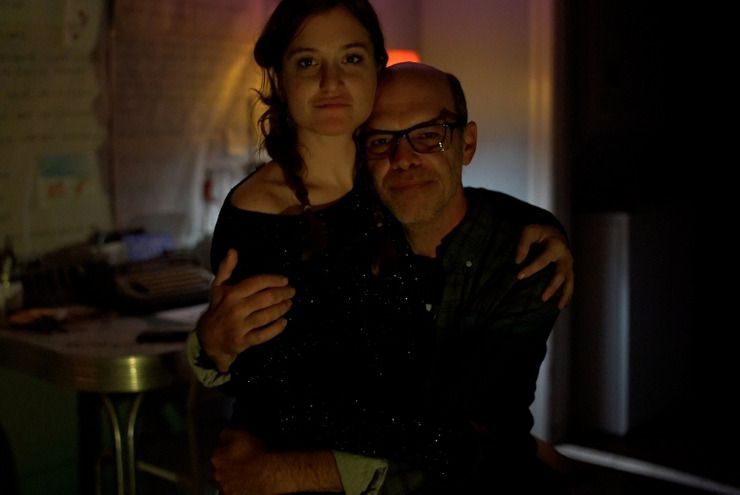
***
AT: How did the union for this project come to be?
TLT: I invited him to this performance I did at Red Dwarf—noise poetry stuff—that was the first time you’d seen me perform. I also auditioned for Jason in college but he doesn’t remember that. [All laugh.]
For what?
TLT: I don’t remember.
JN: I think it was our first Catastrophic play.
TLT: I was a sophomore or something in college. Tony, a mutual collaborator, introduced us to do some writing stuff. What made us start working on this together is that he came to see me. And said, You write like Sarah Kane.
JN: Not even write like, but yeah. I was standing next to a friend and I said, Dear god, T’s like Sarah Kane. And my friend said, Laurie Anderson. I said, Yes, Laurie Anderson, obviously, but also Sarah Kane. That is rare.
JN: That stuck in my head. [The Catastrophic Theatre] was talking about what to do when we got back from the pandemic. We wanted to come back with something ambitious. At first, I thought it was going to be Cleansed. I wanted to talk to T about that right away. We talked about that play for a long time and then decided that wasn’t the play to do right away. So we started talking about all of them.
TLT: And then I read 4.48. I was just like oh, just the way it looks on the page, it’s a fucking poem, and all of that was really attractive to me about it.
What was your relationship to Sarah Kane before?
TLT: That’s funny. I went to school for theater performance but haven’t touched it. I perform, but I’ve been very far away from traditional theater—[I’ve] blocked out college and all the stuff I did in college. Senior year, in your acting class, you do one scene the entire semester. You’re supposed to pick a really difficult, challenging piece. I did a scene from Sarah Kane’s Phaedra’s Love, the blowjob scene, which is very funny. I had forgotten I had done her until we started reading these plays, and I said, Oh, I’ve done Sarah Kane.
JN: Tamarie had done that role. I directed it with Infernal Bridegroom.
TLT: I’d forgotten I had familiarity with her. I read all the plays when he sent me Cleansed. I was familiar with Blasted, I’d seen a lot of scenes in school from it. I saw [the Catastrophic Theatre’s] production of Crave. I came back for something and saw the show and fucking loved it.
Do you remember first reading her?
TLT: It was Phaedra’s Love in college. I read Blasted in college. I thought Phaedra’s Love was so fucking funny.
JN: All of her plays are funny.
TLT: Phaedra’s Love is just fucking hilarious.
JN: There are two left I haven’t worked on, there are only five in total.
TLT: This piece is so exciting because it feels like a large poem, and it’s just so beautiful and inspiring, and we could do anything we wanted.
JN: You have to do whatever you want.
TLT: We were talking about doing a Sarah Kane play for over a year now. We’d been talking for six months before I actually read for him.
JN: It’s not an audition—let’s just get together and read it. It was a fait accompli, I always knew it was T.
TLT: We met a lot, multiple times a month for months and months. That would have been real shitty if you hadn’t cast me in it. Our friend Tony introduced us, my long-time collaborator.
What did you think this was going to look like?
JN: I don’t have a better answer than it was going to look like a Sarah Kane play. I first read her plays and found out about her around the year 2000, around when she died. I didn’t know she was dead yet, and became obsessed with all of them. Phaedra’s Love felt like the easiest one. She’s among my top three playwrights. 4.48 Psychosis has always been the most mysterious and impenetrable one. I looked at those damn numbers for years. What the fuck are these numbers and how do you put them on stage? We didn’t understand what they were until the first week of rehearsal, by that point we had done an incredible amount of research.
TLT: It’s interesting that one felt like the big question mark to you. Of all of them, it was the one I wanted to do because it is so not a play. That was the appeal to me. It didn’t feel like theater.
JN: As we read more about her—when I get super interested in a playwright, I just start pounding all of it, and T was the same way. We found quotes—like her famous quote: I frequently walk out of the theatre early without fear of missing anything. But however bad I’ve felt, I’ve never left a football match early, because you never know when a miracle might occur. She talked about how seeing the Jesus Mary Chain was one of her very top theatrical experiences, and found [her]self longing for a theatre that could speak so directly to an audience’s experience, and that she’s much more interested in performance than plays and much more interested in performers than actors.
TLT: We never worked together and when he said he wanted to be my partner on this, I was skeptical. People say that, but you know, am I? We really were. We did do this together, the whole fucking thing, which felt really cool. I don’t know if I’ve ever done something as collaborative with another person.
JN: There was no decision that was made, explored in rehearsal, that did not involve both of us.
TLT: I brought in James Tempelton, my longtime collaborator. But that was something else we loved about this process. While I went to school for theater, I wouldn’t say I have an extensive background in traditional theater, and James certainly doesn’t, which I think served us well in this show.
JN: In a really endearing way, James wanted to break into theater, which is absurd. You’re so much cooler than theater. It’s almost embarrassing to me that I do it. He was nervous about it in a really sweet way.
TLT: We’d done Red House and Lionshare, two theater immersive pieces that we co-created with another person. He’s designed music for the Houston Ballet, and is into that sort of thing. When we knew projections were gonna be such a big part of it, we knew it would be him.
JN: I’ve never worked with a light or sound designer where the ideas come into the tech rehearsal and I haven’t had to say, That’s great, but let’s do this instead. Can you tweak that?
TLT: We told James to build a library and bring in options. He came to a rehearsal a few weeks out from tech and took an audio recording of the performance and laid it into a video editing timeline and scored the entire piece—which is not what you typically do. You could watch it as a film with just the projections and the audio and the sound. You saw the precision editing; it’s stunning. When I first saw it, I wept. It’s perfect. He designed it like a filmmaker. And like a musician. The whole show was done visually.
TLT: Amy was going to be a projection. The therapist was initially going to be a projection because she wasn’t able to make one show in person.
JN: T asked for Amy.
TLT: Amy’s fucking fantastic. When I was thinking who would be my therapist, it’s her. I also have to be in love with her.
JN: There’s a lot of transference.
TLT: The week we’re shooting all the projections that aren’t archival, stuff of me, and all that, Jason almost killed me. [Laughs.]
TLT: We’d already decided to have Amy do all of her scenes on video only, but she has to leave spaces for me to act, or there’s no room for it to breathe. We also had an idea of Amy being in the audience. But the scenes with us in rehearsal were the best part of the play. The idea of Amy being on video was always a workaround because there was one show she couldn’t make.
JN: We almost forgot it was a workaround. We got so invested in this idea. Like T said, the way it would have locked us into certain things. It’s not the same. The feelings are not the same.
TLT: We initially thought I’m gonna play every part. Then I wanted someone up there with me. I need Amy. I mean the actor in me would really like to have someone. James comes down, and you [to J] were like, Hey what do you think of this? James immediately was like Let’s have her on stage. It’s way stronger.
JN: I wasn’t going to impose a decision. I wasn’t saying we have to do this. It’s more, What do you think about this? It was a very nervous thing for me. If T hadn’t felt good about it, we weren’t going to do this.
JN: At the time, we were hooked on the idea that this woman T’s character is looking for—that doesn’t exist—is the therapist. Her idea of the therapist is not a real person. You don’t know your therapist, so that’s part of transference. You’re in love with someone who doesn’t exist. So it really fit with the text, so we didn’t want to make that the only thing.
TLT: We captured all projections in one week. We had this idea of the doctors [that T ultimately plays in projections on screen behind them], that we’d hire actors to do that. Now that Amy is no longer in the projections, is it confusing to bring in people we’ve never seen? I also loved this idea to not have any men represented in the show. We have an all-women-and-femme-queer-run crew. The orderlies being femme and queer was important to me. I know there’s a lot of dialogue about male nurses and doctors, but I liked having the control of satirizing the male practitioners myself. That felt good. Once we knew Amy was going to be live, I had one day to come up with something for these doctor characters, which just meant a lot of wig sourcing honestly. We threw that together in a day.
JN: We had arranged to shoot in a doctor’s office. Alex, T’s friend, who’s one of the orderlies, her father is a doctor. We arranged for scrubs and all this stuff. Shots of their bodies walking back and forth and close ups of their mouths.
TLT: We shot everything of me in one night in my tiny fucking apartment with just the three of us—me, James, and Jason. All of the doctors, emotional states, flash flicker stuff, breathing. We did all of them in one night. I forgot to tell my neighbors and was screaming in my apartment. [All laugh.]
JN: They kept saying direct her! Direct me! No, just keep going! But I don’t really [direct like] that.
TLT: I worked for three years for James’s video production company so we are very used to being on set together. Funny to be the talent and changing out his lenses. It was a lot of fun.
JN: I brought all my spare medications I was perfectly willing to miss. Tons of Depakote, these big pink pills, for the pills scene.
How early in the process did you decide to have the projections of you that are in relationship to the you on stage?
TLT: We knew, because of the work I do in my personal poetry performance, I use a lot of projections and video in my work, we knew we wanted that. We knew we wanted to achieve a film closeup, and that would be a great way to do that. We went through a kind of script with James, where there were moments we knew we wanted to be archival and moments that would feature me. His decision to put me in the background—during Sometimes I turn around and catch the smell of you—he had a lot of freedom in how we cut that together. We knew we wanted to get some emotional states. We always had that idea for the flash flicker of the mouth to be a filmed projection of me.
JN: Not always.
TLT: Jason wanted me to do that live. How do you memorize that though?
JN: You learned the numbers.
I have to say, I was impressed you remembered those numbers in order, especially when you echo yourself on the audio.
TLT: Goddamn the first set. They’re all out of order. We had the concept of the mouth come up. We wanted that to be the intrusive thoughts section. We captured the breathing and hyperventilating separately. We didn’t know James was going to put that together with the drums. It was fucking beautiful.
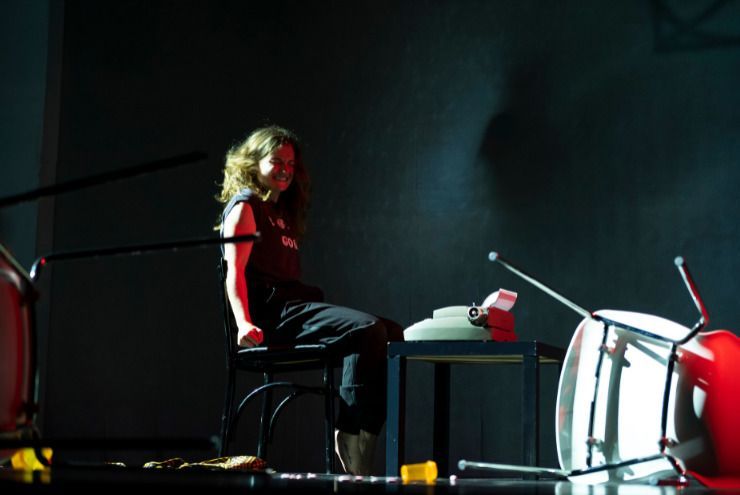
Is the typewriter a nod to you on set?
TLT: Yes, and to Sarah Kane. There’s so much talk about how she won’t be able to work.
JN: I cannot write.
TLT: I won’t be able to think. I won’t be able to work.
JN: How can I return to form / now that my formal thought is gone? At that point she’s very much referencing the typewriter.
TLT: If you know me, [the typewriter] is something I have and do.
JN: We generally try to create those personal connections because the only thing an actor has is their emotional lives.
TLT: Especially with this play. It’s not a Sarah Kane biopic. I’m not playing Sarah Kane. We didn’t create a character, because this is a language and feeling piece so it had to be informed by me and my life.
JN: We were both proud of the fact that we are not aware of another theater that’s ever produced this play that did not promote it in some way by mentioning Sarah Kane’s suicide. That was nowhere in our promotional materials, we never mentioned it. First time anyone would have known about it would be in the Houston Press review.
TLT: The program note wasn’t added until a few weeks in. We didn’t want it to be suicide porn. I love that a lot of my friends didn’t know until afterwards. She killed herself after this? / Yeah.
JN: That’s not what [Sarah Kane] wanted. She wanted to create an experiential depression piece, so that in some way, people could experience what it was like. People who do not have emotional difficulties. We talked a lot about how it was important for the play to be for people who do and for those who love those people, because that’s difficult. For people who had suicidal ideation and for people who lost people to suicide. I don’t like it when people call suicide selfish. Because what they’re really saying is, I lost my friend who was in an incredible amount of pain, but it was selfish that they didn’t stick around for my benefit. This play, I hope, lets those people in on the times they’re not with their friend so they can see. I feel like this character and Sarah Kane and the enormous number of my friends I’ve lost to suicide, they really do try everything. Sometimes this really is the only answer. I saw a production in Chicago that made me so angry, partly because they kept interrupting the play, I guess when it got too heavy for people, by saying TANGERINE BREAK, and they’d throw everybody a tangerine and people would eat a tangerine in the middle of it. That was fucking awful. And then, the way the play ended, it was like a cautionary tale, and there were 1.800 numbers and stuff. The takeaway from that production was, don’t commit suicide. If you’re going to leave with an idea of whether they should or they shouldn’t . . . we don’t know the gender of the character, we don’t know anything. If it’s going to be one or the other, it should be that you are happy for the person. They’re beyond their pain.
TLT: There was a first Sunday matinee that only eight people were at, and a friend who had been closely touched by suicide came to see the show. I gave them the line, I have no desire for death / no suicide ever had. That’s one of the biggest takeaways for me. People who kill themselves don’t want to die. They just don’t want to live anymore. That’s a really hard thing for people who don’t have mental illness to understand. Not lucky in life, but lucky on this project, I have, and, as far as we know, a lot of the people who worked on this play have mental illness, and have an understanding of this.
TLT: There were internal choices we made I grew to love, to your point, that people who killed themselves have tried really hard. We had this whole discussion of my hair, and you know typically I have shorter hair, that at one point, the character shaved her head. She had a psychotic break and shaved her head. I wanted to cut my hair short for the show, and Jason said, If your hair is long, it shows how fucking long you’ve been trying. There was a break, there was a point, a dry run of suicide that didn’t occur. You’re still there, you’re still trying. You’ve been with this therapist forever. Nobody will ever pick up on that, but I would know she didn’t just give up.
It’s also interesting for the clinical space, for the hospital. They’re in there for a long time, and it doesn’t really do what they want it to do.
JN: I’m not sure if the shaving head was my idea.
TLT: We talked about whether I would keep it or not. We know there’s a marker that she talks about two years, a marker of shaving the head. Time’s wiggly in the thing, so.
TLT: I was worried I would feel super dysphoric doing the show as a genderqueer person and looking kind of femme and about how it would make me feel doing that show. Because so much of that show is flip-flopping pronouns, first the lover is a man and then a woman, and I was very, oh I don’t know. It’s an interesting challenge.
Your queerness always shines through. I was curious about the choice for Amy to stay on stage. What was around that choice?
TLT: That happened late. You told her to try staying on.
JN: It’s because you observe things in rehearsal. Amy was really invested in the process. There’s no one like Amy. And it’s so fantastic to watch her watching the work. She wanted to be there for every rehearsal she could, whether she was called or not. To watch her watching what was happening in the scenes she wasn’t in was really powerful.
TLT: It was a practical thing. We didn’t have stairs yet, and we had this three-foot platform, so Amy can’t get on and off, so we put a chair for her. And we were mad, like, Where the fuck are these stairs? It was this sort of happy miracle that she had to.
JN: I remember an organic reason that happened, which was when T started to flow with the play, which happened pretty early on, because you were comfortable with it so much. Once we got out of working on single scenes, we’d let it flow as long as it can. Then Amy would have to go on stage, and it was just a beat, but it felt interruptive.
TLT: In the rehearsal room we were able to flow, but when we got on stage, the flow’s gone and something’s missing.
JN: Even in the rehearsal room, we talked about that. Just be ready to come on stage, so T doesn’t have to break stride. I watched her pretty closely to see how much she’s doing up there. How invested she is, the different things she’s doing.
TLT: I asked her, What the fuck are you doing up there? Amy said, Oh, I do all sorts of things. Sometimes I watch the thing, sometimes I act like what you’re telling me is in the session, I watch you. Sometimes I take notes. Sometimes I treat it like you’re talking to me.
The moment of her leaving the stage feels very . . .
TLT: Opening night, I hear the stage door close. Amy had left the theatre to the dressing room and I heard the stage door close for the first time. It was right when I had to deliver the line, I thought it was silent / till it went silent. I told her, Please do that. Can that be part of what you do every night? I can hear you leaving. It’s like, shit. It broke my heart. She’s fucking gone.
JN: Now you’re making me go back to where I went every fucking rehearsal, I’m weeping. And loving the shit out of the fact that I’m weeping. T has a line in the I am sad section, I used to be able to cry, but now I am beyond tears. I really identify with that.
TLT: You wouldn’t know it in rehearsal. [All laugh.]
JN: No, you would not. We went through a lot of iterations with the therapist saying, I need my friends to be really together.
TLT: Actually our dramaturg, Rob, had an interesting take on that scene, where he said, I have never seen that relationship depicted. Where you’re seeing this therapist forget where they are, and it was this interesting role reversal where suddenly she starts to treat therapy like her therapy, how wildly inappropriate that is.
Yeah, the countertransference.
JN: It was cool and insightful for him to view it that way because that’s how we were talking about it but it wasn’t anything we conveyed to him. We’re not telling people how to treat any of it. I don’t think you watch that scene and necessarily think that’s what’s happening.
TLT: There’s a lot of my performance during the therapy scenes where I’m not looking at her, I’m looking away from her. One of the notes Jason gave to Amy was, Don’t look up until the very end. You can’t look at her. Suddenly you’re in the position where you’re vulnerable and not looking at her.
JN: I did not tell her you can’t.
TLT: He never tells anyone they can’t do anything.
JN: Along those same lines, there’s not a single move that T makes in the play that came from me. She was moving on her own. I do sometimes say, Okay this is working better than that. I don’t think I ever did that in this process.
TLT: I talked a lot with Tamarie and others about my process with Jason. I have a rush of all of these ideas: how it’s gonna look and sound and what it’s going to do. Jason really helped me to slow down. Amy’s so good at just letting the process happen. I’m more like this mad, internalizing creator. So I really focused on just staying within the language. I was so grateful because, when we got to tech, I knew this language and these feelings backwards and forwards. The week before tech rehearsal, I had hardly any movement. I was really just standing there. We did bring it all in that last week. I knew what I wanted to do, but I wasn’t doing it then.
I’m wondering about the standup section, the clothes, etc.
TLT: I wanted it to feel like honoring Kane, [in terms] of it being a performance—not a play, but a performance. I don’t know how you read doctor this, doctor that, and it not be a fucking standup. It sounds like a comedy act. What was great with Jason was how much we shifted in that scene. It’s jokes and jokes and then you did this to me and you hurt me. It became more and more powerful. I knew I wanted it to be a comedy scene. I thought that early on. We talked a lot about this play being exhaustive emotionally. I knew it also meant I had to exhaust every part of what I like about performance. It was my chance to steal from my favorite people. It reminds me of a Laurie Anderson show. The shit I love. James’s scoring was fucking phenomenal. For the anathema scene, I’m obsessed with really slowed-down Elvis Presley, and I knew I wanted to have some Elvis in there. That track’s actually mine, the Suspicious Minds one. And we use Elvis again in Fools Rush In with Sometimes I turn around… That’s 75 percent slowed down Fools Rush In. I got to steal from people I love.
JN: That’s also a piece of what we did with Amy staying on stage. In the rehearsal room, the way T effortlessly moved from one scene to the next, none of it felt like transitions. T was already doing that with the costumes and standup and things like that. It made me think about Brecht. It’s a very Brecthian thing to have one of the characters on stage observing. I didn’t really notice it at first, that we were able to see the transitions, and that went away. For our last tech rehearsal, I said to Hudson and James, Hey, we’re missing something here. We had this thing where we were able to see all the transitions and didn’t look like we were hiding anything, and there’s something very lovely about that. If you could add something in, that lets us see this stuff.
TLT: What he’s asking for is more than 24 new cues to be built the day before we open. [T laughs.]
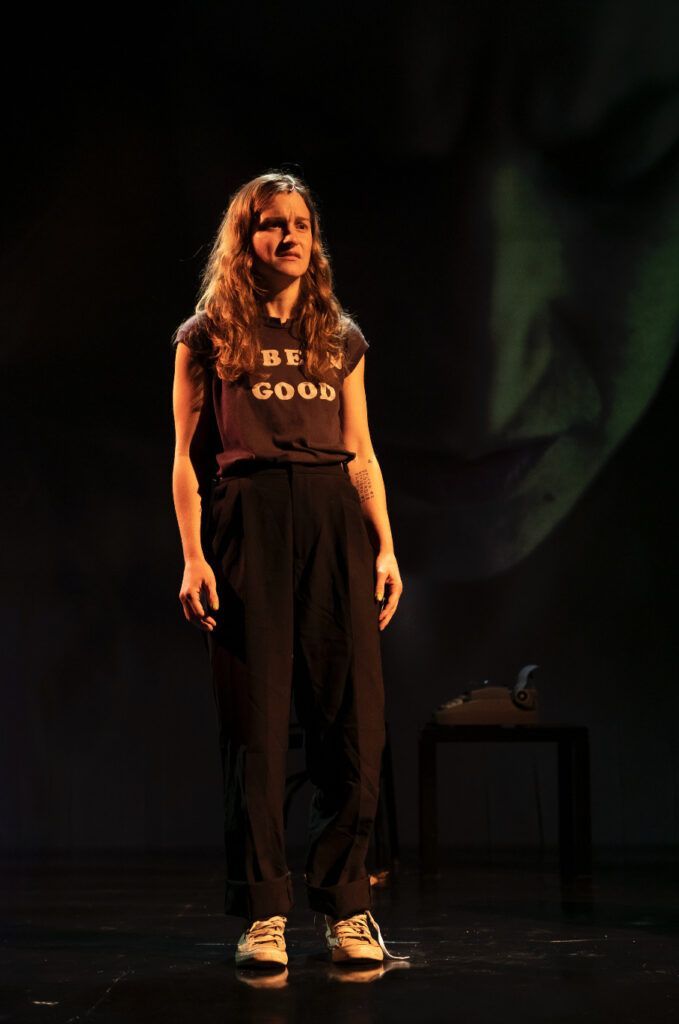
JN: Hudson [the lighting designer] was so cool: Should I save a backup of what we’ve done? I said, Well if we’ve saved the backup and we don’t like what we’ve done, could we bring it back? / Oh no, not really. [J laughs.] / I don’t care if it’s a light thing, or sound thing, we have to attach it to the prior scene somehow. We wound up with two blackouts in the play, before either number. [During] Stark light.
TLT: James and Hudson improvised in a run.
JN: It was immediately amazing. You were up there, so you couldn’t see what was going on.
TLT: We felt that she was talking about her work and her life. And we took that as a cue with costuming as well – everything was from me. That is my work, that is my life. The character in the play is realizing she can’t be that anymore. She’s losing the ability to be this performer, to be this person. She’s very strong at the end. When you see the anathema character, which reminds you of a standup character who is just fucking off the rails, for me, this is my character’s work and it’s slipping away.
JN: T was working her machines like she did in the performance. It was hilarious, it was really moving. I remember how exciting it was. The costuming I think also. [TLT: nothing I wore was not mine.] I chose one thing which was the I Been Good shirt. It was in T’s profile pic. I was in love with that picture and that shirt. [TLT: We wanted it at least in the I am Sad scene. / AT: I really love the reveal of the back too. TLT: YES!] There’s a double entendre there too.
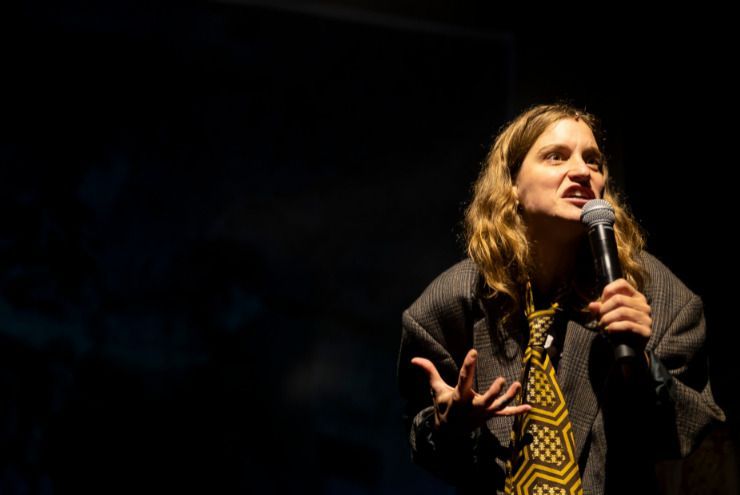
TLT: I’m sentimental about costuming. The tie is Tony Barilla’s tie and the big brown coat at the end belongs to my best friend. It was important to me. I’m a fucking sap.
JN: Or you are just taking it all very personally, which is how it should work.
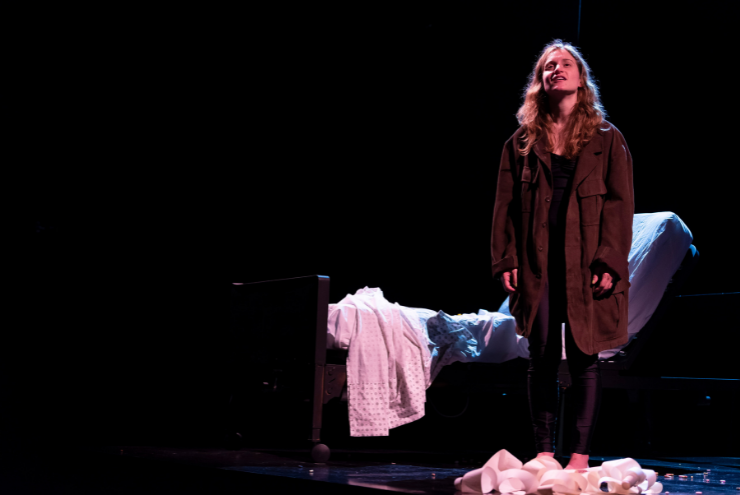
Yeah, you’re just connecting to it. What about the house lights coming on at certain moments and you giving lines to people?
TLT: We knew from the beginning we wanted to do that. We wanted to fuck with the theater paradigm. [To JN: What was it that person said? The play felt that you become complicit in what’s going on? JN: Yes, you’re right!] You’re putting this onus on people. One of the earliest treatments of I am sad we treated like group therapy or AA meeting, you’re looking at people and you’re telling them why you’re there.
JN: We went through a few. The very first was, what’s wrong? Just, for every line.
TLT: I think we wanted the audience to feel. I wanted to be able to look at them, to see their faces. Also, that’s how I generally perform when I perform poetry and so much of this is direct address and to not just be staring out into blackness but connecting with people. There were also times Jason suggested—he said, There will probably be people you know in the audience every time. Give them the lines you want to give them, which became important and special.
JN: I can’t see who she’s talking to, obviously, but I know that’s been very emotional for T.
TLT: In the scroll section, there were times all my partners were in the audience, and I’m just fucking dying, just weeping about those. It was intense to be able to see them.
JN: And the I came to you hoping to be healed, giving that to the audience, was a big deal. I remember for a while T was giving me the line, you’re breaking me. [All laugh.] I’m sorry! I gave one very instructive note throughout the rehearsal process which was Breathe.
I’m curious what Rob’s role was and how that worked, especially since the two of you are engaging with Sarah Kane’s work and all the layers.
TLT: We did most of the research ahead of time. We knew every book she read while she wrote the play [JN: Yeah, seven of them.] We had a few questions for him to go chase down.
JN: He did bring some articles we had not found that were very revelatory. Then we got happy about the thing we were doing with raising the house lights, fucking with the usual order of events at the end of the play, like, where you’re given, here’s where you clap. In one of those articles there’s a lot of talk about witnessing, and what it is to be an active witness to a life like this. That also made sense with T’s line: Victim. Perpetrator. Bystander. [TLT: It’s what you did, who was there and who you’re blaming.] Yes, that, too. So the audience becomes a part of that. I hate audience participation. I will leave the theater if they try to get me to do that shit. I feel we were so gentle with it. We glowed the house lights as low as they could be glowed. [TLT: Except for abstraction, which was the brightest scene in the fucking play. I could see all of y’all. The screen is fucking white.] Oh, that’s why. [TLT: And there’s bright stage lights. It’s when the pills are dropping.] That’s right, but we didn’t bounce up the house lights. Some of the people I talked to after, they’d talk about one of those sections and I’d say, Could you tell the house lights were on? No, no idea. / I just felt she was making eye contact with people.
TLT: I forgot until we were in rehearsals, or in the space, oh people are gonna be wearing masks! Which is also a kind of a mindfuck I didn’t get. There were times when I’m fucking comedying my ass off, and I’m like, is it working? I can’t fucking tell! I can tell when people are emotional. I can tell if people are crying. I cannot tell if people are smiling. I cannot tell what their faces look like. That line, a room of expressionless faces… [All laugh] was just so funny given it was a COVID play.
A COVID play. That’s such a sad word.
TLT: I know! But, yeah.
JN: There’s nothing sad about this process though. What’s sad about this process is that it’s about to be over. It’s devastating.
TLT: I can’t iterate enough how this may have been the healthiest and most positive creative process I’ve ever been in. I’ve been in some pretty good creative processes, some pretty unhealthy ones. I don’t know how else we could have done something so personal and difficult if we didn’t all feel so safe.
I can imagine that going a number of different directions in the wrong hands.
JN: And now, we want to do so much else together, not necessarily theater.
Do you have any plans for the future?
TLT: Take an overdose, slash my wrists then hang myself. [All laugh.] / We want to do Cleansed. We have an idea for Cleansed.
JN: We’ve talked vaguely about other things, nothing very specific, just the idea that we very much want to do this.
TLT: We want to write something together. I want to do some film stuff, with James and Jason, something we’d work on that’s a film potentially, too.
JN: And when James came in with his film projections, we went out and were super lovey dovey with each other, and we said, We just have to keep working together, the three of us. Our favorite part of the Press review was where the three of us got mentioned in one sentence.
TLT: It was fucking special. I remember the night Jason and I met to talk about it, and I thought there was already a sound and video designer. You told me there wasn’t. That night we literally called James and said, can you meet us now? He’s like, okay. And I said (to J), What if he hates the script? He read the script: I don’t fucking understand what the fuck we’re going to do with it. I don’t know what it means. But I’m in. Let’s do it.
That’s amazing. Okay, let’s talk about the ending.
TLT: Yeah! Let’s talk about the ending!
Which is basically why I wanted to write about this after the show is over—I can’t write about this and not talk about the ending.
TLT: The end. You see how it looks on the page. All that space. What the fuck does please open the curtains mean? [JN: We still don’t really know.] Artaud was one of her big influences. I found this poem. This fucking line will be burned into my head forever. The last line of the play, well, before please open the curtains, is It is myself I have never met, whose face is pasted on the underside of my mind, which we took to mean, maybe, the her she is looking for is her. The person she could never find was herself. There’s this gorgeous Artaud poem called “Love,” and the last stanza is, She who sleeps in my bed / and shares the air of my room, / can play dice on the table / of the ceiling of my mind. Which, just, fucking slay me, right? That’s so sexy and beautiful and stunning. She just copped that shit, right out, you know what I mean?
JN: She talks about [both, in unison: literary kleptomania] and how theft is [both in unison: the holy act / On a twisted path to expression].
TLT: Which is why, when James was doing the sound design, he said, we’ve gotta get some of your slowed-down Elvis in there that you love. The ending is our big kleptomania piece. We didn’t know what to do with it. We were out at Two Headed Dog a few weeks into rehearsal, not very far along, and I had a picture I wanted to show Jason, which I’ll show you. This is what I want to do in the end.
JN: It was really the tenth idea.
TLT: Well, yes. It is Laurie Anderson at Coney Island.
Oh my god.
TLT: The piece is called The Art of Falling. I can find no information about what she did or what the performance is. It’s an Annie Liebovitz photo. I saw it and I was like, That’s it. That’s the ending. I had no idea how to do it, or how to make it happen. I think Jason didn’t believe it could happen.
JN: Well, I thought it was a beautiful idea. T tracked down the people who did know how to do it. I was concerned about the safety of it. When we got closer, I was concerned about it happening smoothly each time and not disrupting everything that had brought us to that point. I didn’t want to have to stop, and do a thing.
TLT: I loved that image. I’ve been a huge fan of Laurie Anderson’s work forever and had never seen that photo.
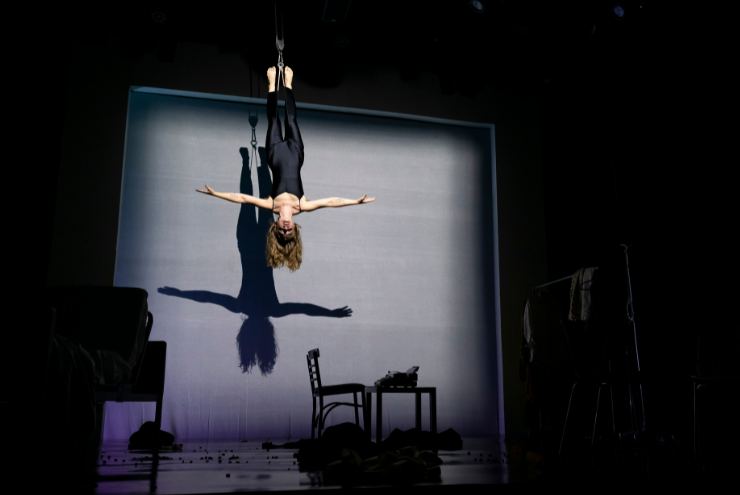
Yeah, I’ve never seen it, either.
TLT: When I saw it, I was like, holy shit. It’s fucking stunning. I love the inverted cross. I come from a religious background and Sarah Kane does, too. It is a hanging, in a way. But it’s beautiful and it’s not grotesque. I had no idea how we were going to do it, but I knew who to ask. I reached out to Ms. YET. Do you guys know anyone? / My partner Remi has done this at MATCH, for a different MATCH box. All of that hardware was already built and fit to the MATCH grids. It was so fucking serendipitous we figured that out. Do I have to go off stage to get into this thing? At first we were going to hang me by my ankles, but that’s very intense on the body. Then Remi said they used rope climbing ties, all that’s on is just nylon under the body suit. I knew Jason was going to fight me if it wasn’t seamless. I worked so fucking hard to figure out how to make it beautiful, make it not something that broke the flow.
JN: T did every single part of that. She found the people and arranged for them to meet her up there [to rehearse]. We were talking last night about how seamless this process has been and how this isn’t specifically about the ending, but the ending is a good example of it. It’s so unusual that a play so challenging on the face of it never really felt like a struggle.
TLT: Working the ending was hard for me in tech. We spent hours trying to figure out the ending, how I go back there, how to minimize the number of moves. Initially, we thought someone would come on and put me into the thing but that felt wrong. It’s the end of the show, I’m very emotional.
And the muscle tension you have to use to hold it for that long?
TLT: We did a lot of fucking practicing. I practice every night—I go up, make sure everything’s working and functioning. That was a part in tech rehearsal. At one point, the sandbag’s too heavy. I can’t work the clip. I’m having trouble and I’m trying to do it with one hand, and we don’t know what to do. We took this break, and I’m fucking frazzled, and everyone’s giving me this feedback while I’m hanging upside down. Everyone’s a little concerned. I’m a gymnast, a person who’s done a lot of stuff with my body. This shit doesn’t scare me. I’m gonna be safe, and I trust the people I’m working with. We came back from break and I said, Can I sit in the audience and say my lines and we can run the cues and just watch what’s happening and then visualize it? Then I was, like, Okay, James, take the ending video and speed it up and reverse it, use that. Put a light in the audience’s eyes, blinding them at the end before this happened, even if it wasn’t this hang. Loud, loud, loud, and then once I’m up, drop everything out. “Treat the hanging like a ritual” was a note Tamarie gave me. The turn, the sit. What I started to say in my head were the three things the character says: Swallowed / slit / hung. Take off the thing, swallowed. Put myself in, slit. Hung. These three steps. James gave me a great note: It takes as long as it takes. It’s the last thing you’re doing. Calm down, breathe.
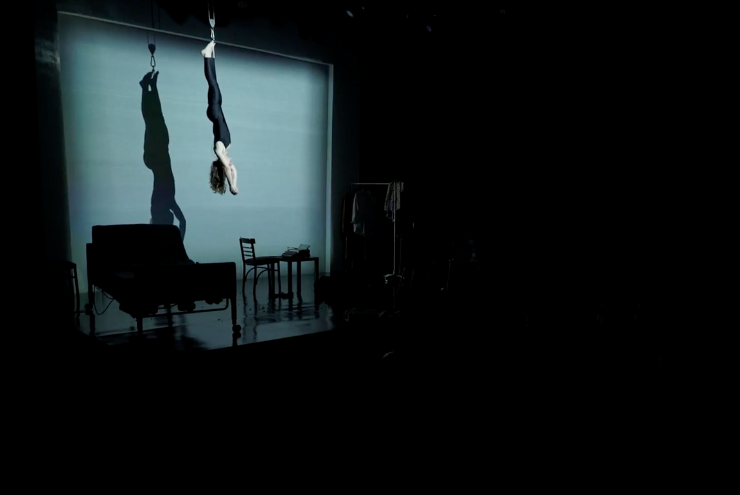
JN: I wasn’t thinking about it at all that way, the taking your time. But it is a thing I talk about in other ways. If you go quickly in a play, it feels long. If you take your time, it feels short—hich is counterintuitive, but it’s true. Tamarie, and I can’t remember who else, said, I can’t believe that was the end. It was over so quickly.
TLT: Then we were working up to what we do, and the ending of bringing up the house lights and the work lights, and not going to blackout, and not doing a curtain call.
JN: We’d said pretty early on, no curtain call. And for T not to come out. She just splits.
TLT: And to see what different audiences do. I remember the first time we practiced it. I stay for ten minutes. That’s the protocol. I say the last lines, my arms drop, the ten minute clock starts, and if people are still in there, I get lowered, and one of the orderlies comes on and unhooks me and drags me off. If everyone leaves, I get to come down.
JN: Our original idea was how do we get them out of there before the 10 minutes are up, so that we can lower her? It was not our intention for people to stay that long. We were going to give them a hint, or have the stagehands come out, to gently realize they can leave. We didn’t ultimately do that. I can’t remember if you were at that Sunday show.
I remember you telling me about it.
JN: They just didn’t move. They didn’t want to interrupt anything. I couldn’t believe it. T came down, she was dragged off, and they started to sweep up. They’re still here. This is not staged, a theatrical idea. That’s it, she gets dragged off, they’re going to leave. They stayed and watched them reset the entire set. The booth lighting turns off, which turns out to be the last thing that happens in this order of events we hadn’t planned. They just sit there and watch the clasp swing back and forth, like a pendulum.
TLT: We started talking about how it felt like a wake in the end. Where people can stay. One of the last things she says is watch. Now there’s this beautiful thing of the people that did stay. The whole play she’s like look away from me. Then she’s like, watch me, watch me, watch. It always feels good to me when I’m up there and people don’t leave until I come down.
I really like, not just seeing you get dragged off, but the cleanup. It feels as if someone were to kill themselves in an institution or, it’s what happens.
TLT: It’s what happens.
My therapist and I talked about it the other day, and she gasped. I didn’t stay! I don’t know what happens! She felt the end showed depression as a state of suspended animation.
JN: That’s beautiful.
TLT: I like how it’s been called a Marvel ending. The ending is so different every time. Opening night, a pill stuck to my foot and fell to the ground. I just start fucking laughing. The medication has left my body! The funniest fucking shit. Sometimes I get pulled up, they pull me too fast, and I’m spinning. That’s euphoric and feels really good. It wasn’t until the first or second night, where the line, It is myself I have never met, whose face is pasted on the underside of my mind, I was like, this ending is perfect. Because she’s never been able to see the underside of her mind, and now she’s upside down. It’s in this last moment, the beauty of the simplicity of being upside down, and, oh there I am. Which was not our intention. Our intention was that I saw a beautiful image of my hero and I wanted to do it. It’s become so much more than that, which is really special.
JN: I remember one time we met to talk about the play and started talking about the fact that you can’t know yourself the way other people know you. You can’t see yourself from the outside. That seemed to make sense with this idea. T also had a great idea how to end the play before this, when we thought Amy would be on video. We were going to do a live feed of Amy from the dressing room. We were going to set up a therapist’s office, and then she gets up and leaves. Then T exits the stage and comes into the live feed and delivers the last two lines. We were in love with that idea until we had a better idea. We talked to Tamarie, who said, there’s a delay [on the live feed] that makes the intimacy of the back and forth not work.
TLT: I’ve read a lot about what people do with the ending; it’s always hard. What the fuck are you supposed to do? I think we did a good fucking job.
The second time I came, I tried to see if you stayed up there for 4:48.
TLT: Ohhhhhh.
JN: But that reminds me of what we wanted to do with one of the shows.
TLT: We wanted to do one at 4:48.
JN: We wanted to do a 4:48 a.m. performance.
TLT: Amy pointed out, and it’s more accurate, you need to do the show prior to that, so she died at 4:48. It would have to be a 3:00 a.m. show.
That would be hard to time perfectly, too.
JN: We have names for all the scenes. It wasn’t intentional that we named them. That [the scroll scene] is called the needs scene because one thing we learned through the articles Rob brought us was that this was a list of things a suicidal person would need in order not to commit suicide, and it’s an incredibly long list, and clearly unattainable.
TLT: Some are taken from—is it The Schizophrenic Mind?
JN: The Suicidal Mind.
TLT: And some she wrote herself.
JN: She lifted a lot, she always has. Shortly before the literary kleptomaniac line is a quote from a reviewer who hated the plays always and referred to her as an expressionist nag stalling between two fools. We talked a lot about what that might mean. We hadn’t settled on anything, exactly what it meant, except that it was a quote she resented. Because the line right after that is They know nothing — / I have always walked free. This is not the first time she’s being shitty to a critic who has condemned her work feverishly because the first production of Blasted, the review had a headline This Disgusting Feast of Filth. It was very dismissive: This woman shouldn’t be writing plays; she needs professional help.
TLT: You hear that in the body and soul monologue, where she’s like, the sword in my dreams / the dust of my thoughts / the sickness that breeds in the folds of my mind. She’s talking about the perception of her work.
JN: Yes. The writer of that Blasted review is named Jack Tinker. So, the sadist in Cleansed, who performs experiments on people to test the boundaries of love, is named Tinker. So she named the sadist after the guy who wrote the nasty review. [All laugh.] Which was very hurtful to her, that review. This was not the first time. Then that same critic who had written that about her, referred to the fact she has referred to a line he has written, and he’s angry about that. Rob found those reviews—they were really hard to get, they’re behind a paywall, you can’t go back that far. They’re not searchable. But he can do this research in ways we can’t. I said, Can you find that review that quote is from? He really tried hard, he didn’t get it until the last week. The expressionless nag one. His review of Cleansed. And he wrote a nasty short review of Crave, and then wrote another nasty review of 4.48 Psychosis. So Rob sent this the last week. I just need to warn you, these are brutal reviews. I thought, I’m not reading these. I’m not going to get in my head about it. Now you just read them and you just go, it’s fucking wrong.
TLT: This is a big joke and is important to me. The one thing I told Jason is, it can’t be bad.
JN: Passable is fine.
TLT: This is a play that doesn’t get reviewed well. I really felt like it’s such a play that lends itself to someone getting up there and raging, but it needs this layer of performance. Because otherwise who’s going to hear this gorgeous language? These beautiful emotions. It can’t be bad. It doesn’t have to be good. It can’t be bad.
JN: You told me that that night we went to Double Trouble, when you had that enormous breakthrough. I wanted to go over and hug you, are you okay? That’s intrusive. Just let T have her time. When we came back from the break, I said, That’s great. Let’s call it for the day. I asked if she wanted to have a drink. That’s when you said to me, it can’t be bad.
It’s interesting to think about the productions of her plays being reviewed badly because it seems like so much is dependent upon what choices they make.
JN: I don’t think this play is received poorly. This play is a cult hit in a lot of ways. When the production is good.
TLT: For me, god, I was weeping to Jason, I’m gonna miss the language so much. Why I connected with it, my favorite fucking shit. My favorite part is the body and soul monologue. Some of that poetry doesn’t make any fucking sense, it just sounds gorgeous. That was so important to me that it be this piece where language is the jewel of this piece. If you’re not treating it that way then it’s going to fall short.
JN: It’s your treatment of the language that makes it so impactful. It would be really easy to not hear everything that she’s saying.
Which is why it’s so great you have a poet working with a play like this.
TLT: Rob also said, It’s fantastic that it’s this poet doing this piece. One of my favorite fucking reviews from Stephanie Gonzalez, she comes to all of my shows, but is not a language person. That’s not her entry point. Stephanie was like, I don’t know about half of what you’re saying, but the way it sounded in your fucking face. She still felt it. I don’t know what it meant, but I felt all of it.
Usually that doesn’t happen in poetry that’s in drama. It usually only happens in poetry that’s in collections, that’s printed. Which I think is interesting about Sarah Kane’s work. All of it doesn’t have to be understood in the same way.
TLT: I try to convey to people how beautiful it looks on the page. When I first read it out loud, it’s just so beautiful. The construction, how it looks, is so important. How do you show that?
JN: I’ve never worked in this way, and I don’t want to work in a different way. I don’t want to work without T. I know that that’s not realistic. But it’s been a very magical thing. When I say it wasn’t hard, I don’t mean working on the play, but somehow with this play that should be so hard. You read it, going into it, how the fuck are we gonna do it? Yet every day, I always asked T, how did it feel? Sometimes she’d say, Fine? I was in my head a little. Bullshit. It was fucking great! Even when you’re in your head. There never seemed to be a super challenging rehearsal. That’s unprecedented. There’s a point in every process I’ve been in where I just have a terrible dark night of the soul. I made a terrible mistake. It’s not working, I don’t know what to do. This one just never felt that way. It’s been so special.
It’s not easy to collaborate, either. That also feels magical about this.
JN: It did feel easy, to me.
TLT: Tamarie talked about our working relationship, because she’s worked with Jason a lot. She said, I know Jason can get the best emotional performance out of anybody. Then you had all of these ideas how we bring in all of this tech. It felt so good. Felt so well matched. It’s been such a great process. We like each other.
It’s important. [All laugh.]
TLT: I don’t think I’ve ever seen another collaborator weep like a baby like Jason. So much fucking weeping every fucking day, right baby?
JN: We like to play with each other. Our position always has been that this play is not a suicide note. That her suicide was incidental to the writing of this play. She was reading about suicidality in a way that a researcher would, to research a thing that she would write about. Her mood state informed the play. She was reading The Suicidal Mind, Sisyphus, The Chronicles of Narnia, The Bell Jar.
I fell in love with Sylvia Plath when I was 18 and going through depression then.
JN: That’s true of a lot of people. During this process, I became re-obsessed with her and exponentially more obsessed than I had been before. Three times I went to Tony and said, Thank you, thank you for introducing me to T. / Stop it, all I did was introduce you.
TLT: I said that you’re in love with a dead woman. I am, too, but that’s fine. I would have a better chance with her.
JN: Yeah, that’s true.


